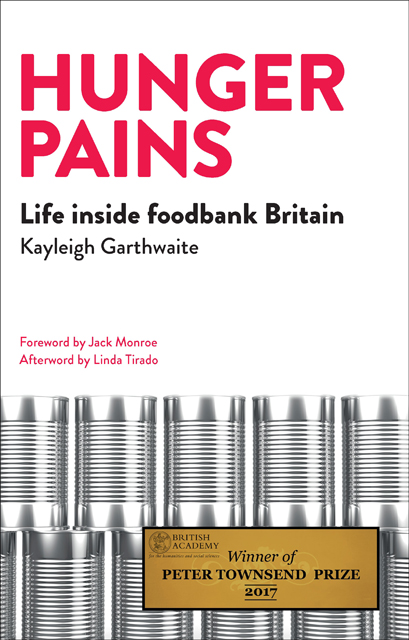Book contents
- Frontmatter
- Dedication
- Contents
- List of figures and boxes
- Acknowledgements
- Foreword by Jack Monroe
- Introduction
- one Researching foodbank use
- two Foodbanks: what do they do?
- three The politics of foodbank use in the UK
- four Why do people use a foodbank?
- five All work, low pay: finding, keeping and doing precarious jobs
- six “Doing the best I can with what I’ve got”: food and health on a low income
- seven Stigma, shame and “people like us”
- Conclusion: is foodbank Britain here to stay?
- Afterword by Linda Tirado
- Notes
- Bibliography
- Index
three - The politics of foodbank use in the UK
Published online by Cambridge University Press: 15 April 2023
- Frontmatter
- Dedication
- Contents
- List of figures and boxes
- Acknowledgements
- Foreword by Jack Monroe
- Introduction
- one Researching foodbank use
- two Foodbanks: what do they do?
- three The politics of foodbank use in the UK
- four Why do people use a foodbank?
- five All work, low pay: finding, keeping and doing precarious jobs
- six “Doing the best I can with what I’ve got”: food and health on a low income
- seven Stigma, shame and “people like us”
- Conclusion: is foodbank Britain here to stay?
- Afterword by Linda Tirado
- Notes
- Bibliography
- Index
Summary
“Earlier this year, we learnt from the Citizens Advice Bureau of a single mother who had to rely on a Salvation Army food parcel to survive. A Salvation Army food parcel, in this, the fourth richest country in the world, run by a Labour government.” (David Cameron, speech given at the Centre for Policy Studies, November 2005)
“Obviously there has been an increase in foodbank use. That’s partly because of, you know, the difficulties we have faced as a country. It’s also, Jeremy, because we changed the rules. The previous government didn’t allow Jobcentres to advertise the existence of foodbanks.” (David Cameron, speaking to Jeremy Paxman on Newsnight, March 2015)
In 2010 foodbanks were a largely unfamiliar concept, but five years later, over 1 million people have used them. Despite the rising numbers of people accessing emergency food provision, the government has struggled to explain why foodbank use has risen, and continues to dismiss the links between welfare reform and foodbank use, even when faced with concrete evidence from frontline staff, charities and academics. In this chapter, the moral gaze that politicians often turn on the ‘undeserving’ in society is turned onto ministers who have attempted to justify rising foodbank use in the UK.
Measurement and controversy
Currently there is no national measure of the extent of emergency food aid across the country. There is data from Trussell Trust foodbanks, but data from independent foodbanks is virtually non-existent, making it impossible to know just how many people are using the many foodbanks across the country. ‘The government does not monitor the use of food banks and has no plans to do so,’ the DWP said in response to a Freedom of Information (FoI) request in December 2013. In March 2015, the department confirmed that this remains its position. The government also does not collect data on people living with food insecurity in the UK, despite repeated calls to do so. But even without comprehensive data, the very existence of foodbanks poses a troubling question: why, in one of the world’s richest societies – and in a country that prides itself on having welfare provision designed to care for its citizens from cradle to grave – are so many people going hungry?
- Type
- Chapter
- Information
- Hunger PainsLife inside Foodbank Britain, pp. 57 - 72Publisher: Bristol University PressPrint publication year: 2016



